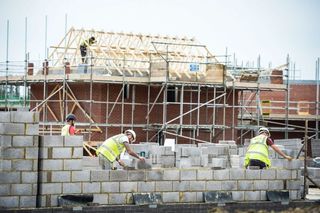Mortgage delays: thousands risk being forced onto higher interest rates as banks too slow on switcher applications
Completing a move to another lender is now taking up to four months due to logjam as customers rush for alternative loans
The rush to switch mortgage provider is leading to major delays in approvals. Photo: Andrey Popov
Thousands of homeowners face being caught by the wave of rising interest rates because overwhelmed banks are too slow to process their mortgage-switching applications.
The Central Bank has no plans to take banks to task even though delays are a breach of its consumer code.
It is now taking up to four months to complete a switch. The reason is a backlog of borrowers rushing to move to a lower-cost provider ahead of mortgage rate rises.
Any delay will leave borrowers at a high risk of missing out on the interest rates currently on offer.
Banks lend at the rate at the time a mortgage is drawn down, not the rate offered at the start of the process.
That should not be a big issue because mortgage approval in principle is required to be given within 10 days under the Central Bank’s Consumer Protection Code, the rule book on how regulated firms are supposed to treat consumers.
But brokers say it is taking as long as 22 to 36 days to get approval in principle for switcher clients.
The brokers report huge frustration with service levels from the banks and other lenders in relation to handling mortgage switches.
Managing director of broker Switcheroo Mortgages Alison Fearon said that for most banks and lenders it is taking four months or more to complete a switch.
Read more
Thousands of borrowers on variable and fixed rates are rushing to lock into current low fixed rates for as long as they can afford to fix.
Some are breaking out of fixed rates early and even trackers to avoid surging rate rises.
It comes after the European Central Bank (ECB) hiked its main lending rate by 1.25pc in the last few months, with warnings of more to come.
Borrowers can still get five-year fixed rates at 2.5pc.
However, there are fears that such rates are soon to surge much higher.
If a five-year fixed rate went to 3.5pc it would mean a borrower would end up paying an extra €130 a month to lock in for the five-year rate.
Over a year, this would cost an extra €1,560 in repayments. This is based on a €250,000 mortgage, on a 25-year term, with an 80pc loan-to-value ratio.
Martina Hennessy of broker Doddl.ie urged banks and other lenders to honour the rates people are approved for because it is taking so long to get lending deals done, leaving borrowers exposed to much higher rates.
Asked what it was doing about the poor response time in completing switches, the Central Bank made no reference in its reply to taking any measures to force banks and other lenders to improve their service levels for switchers or get them to honour lower rates.
The Central Bank said mortgage providers were required to inform customers of their decision on the mortgage application within 10 business days. If not, customers must be told the reasons for the delay.
Apart from a Central Bank rule on the initial mortgage application decision, it is a commercial matter for mortgage lenders how long the rest of the application process takes.
“The Central Bank expects that the quality of service to customers by firms is in line with their expectations and the firms’ own internal service-level standards and that all financial firms take a consumer-focused approach and communicate clearly, effectively, and in a timely manner with all customers,” the regulator said.
Read more
Join the Irish Independent WhatsApp channel
Stay up to date with all the latest news














